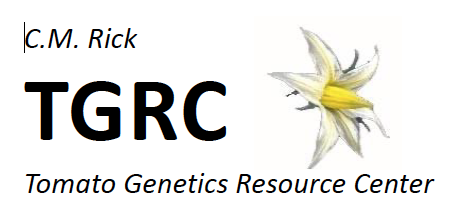Seed Distribution Policy
The TGRC distributes seed samples to bona fide researchers, breeders, and educators. In accordance with the policy of the US National Plant Germplasm System, we do not normally provide material to home gardeners or amateur breeders. However we maintain a list of alternative seed sources here.
The standard sample sizes are 25 seeds for most self-pollinated, homozygous stocks, and 50 seeds for outcrossing wild species populations or other segregating accessions. Available seed quantities of some stocks may be very limited, and some accessions may be temporarily unavailable for distribution.
Users are expected to multiply the seeds we provide to meet their future needs. If you are having trouble reproducing any of our stocks, please let us know and we will try to offer advice.
To help us keep up with demand for our stocks we ask that users request no more than 50 accessions at a time. Please only submit one request at a time. You can submit a new request when your previous one has been received.
If you would like us to provide a draft phytosanitary certificate for review please notify us immediately as finalized phytos can not be edited
Suggestions: the wild species core subsets capture most of the genetic diversity within each species with a reduced number of accessions; for introgression line populations, researchers can initially sample the 'primary' subsets of each IL library.
Seed Request Guidelines
International requests:
Import permits. Recipients are responsible for obtaining import permits and/or letters of authority for shipment to their home country, if required. The TGRC cannot obtain phytosanitary certificates or ship seed until the required permit/LOA is received. If you are not familiar with the import requirements for your country, please check with your local agricultural authorities. For questions, contact us at tgrc@ucdavis.edu.
Phytosanitary Certificates. Seed shipments from the TGRC to researchers in countries outside the U.S. must be accompanied by a phytosanitary certificate. Due to the increasing cost of obtaining phytos, we ask users to reimburse the TGRC for these expenses (currently $90). We will provide a link to a credit card payment site.
Country-specific restrictions.
- Sudan, Cuba, Syria and North Korea: we are unable to ship seed to these countries.
- Iran: OFAC license required.
- Israel: researchers may need to obtain an import permit waiving some phytosanitary requirements.
- Japan: researchers must obtain an import permit that waives the requirement that seed be tested for Potato Spindle Tuber Viroid, Pepino Mosaic Virus, Columnea latent viroid, and Tomato chlorotic dwarf viroid. This applies to seeds of S. lycopersicum, S. pimpinellifolium, S. galapagense, S. cheesmaniae, S. arcanum, S. peruvianum, and S. chilense.
For more information on the phytosanitary restrictions of specific countries, please see our summary, or consult the USDA's Phytosanitary Export Database.
Processing times: 2-4 weeks for domestic requests, 8-12 weeks for international requests. Thank you for your patience.
Shipping options: Domestic seed samples will normally be shipped via Air Mail. International requests ship via Priority Mail International (6-10 days, $55), or USPS Priority Mail Express International (3-5 days, $95). We will provide a link to a credit card payment site. To use DHL or FedEx, please provide an account number.
For questions contact us at tgrc@ucdavis.edu
